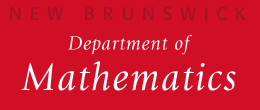MESSAGE FROM THE DEPARTMENT CHAIR (Richard S. Falk)
This was a year in which there was much to be proud of in terms of the accomplishments of our Department. In its most recent ratings, US News and World Report ranked the Rutgers Mathematics Department 16th overall and 6th among state universities. Several noteworthy events took place in the Department this year. A Conference on Noncompact Variational Problems and General Relativity, in honor of Haim Brezis and Felix Browder, was held October 14-18, 2001. In early May, the Department held a lunch to honor Adrienne and Maurice Weill for their generous support of undergraduate scholarships and graduate fellowships. The six undergraduate scholarship winners, Stephen Healey, Sara Jane Leslie, Rahul Malhotra, John F. McClain III, Craig Phillips, and Jared Smollik and graduate student award recipients Nicoleta Calinescu, Juan Davila, Brian Manning, Carlo Mazza, Yuka Taylor, and Liming Wang participated in the event and demonstrated the very high quality undergraduate and graduate students the Department is attracting. As in past years, the Department hosted a large number of seminars and colloquia and many distinguished visitors. This spring, Maxim Kontsevich gave a series of lectures on "Axiomatic quantum field theory."
Dan Ocone is completing his two-year term as Undergraduate Vice-Chair. I would like to thank Dan for doing a terrific job and welcome Gene Speer, the next Undergraduate Vice-Chair. This summer, we have instituted a new position, Summer Advisor and Mentor. Professor Paul Feehan will serve in the position advising students on summer courses, reviewing courses for transfer credit, and mentoring Mathematics Department graduate students who will be teaching their own courses for the first time. Next year, Professor Jerry Tunnell will become the Director of Professional Development for Graduate Students taking over from Professor Jim Lepowsky. Thanks to Jim for a good job helping our graduate students.
I am pleased to announce that Rutgers will begin offering this coming fall a new interdisciplinary Ph.D. granting graduate program at the interface between the Biological, Mathematical, and Physical Sciences (BioMaPS) designed to serve the needs of the increasing number of graduate students from the physical, mathematical, and computational sciences who are being drawn to the biological sciences and, more generally, to educate a new generation of life-sciences researchers with more sophisticated quantitative skills. The Department of Mathematics is one of several departments involved in this program and also in the new BioMaPS Institute. The Department's efforts in this initiative are being led by Professor Eduardo Sontag, who serves as a member of the Steering Committee.
A broad spectrum of information about the Department, both
current and from past years, is available on the Mathematics Department web
site. In particular, honors awarded to faculty in previous years
may be found on the
faculty honors page and honors received by undergraduate and
graduate students may be found on the
Mathematics Department Undergraduate Awards and Prizes page
and the
Mathematics Department Graduate Awards and Prizes page,
respectively.
The Ostrowski Prize is awarded every second year for an outstanding
contribution in the field of mathematics. The Ostrowski Foundation, which
awards the prize, was established by Professor A.M. Ostrowksi of Basel
(1893-1986). The prize consists of 50,000 Swiss Francs for each prize winner
and the possibility to nominate a promising young candidate for a Postdoctoral
Fellowhship of 30,000 Francs. Professor Iwaniec shares the 2001 prize
with Richard Taylor (Harvard University) and Peter Sarnak
(Princeton University).
We congratulate these colleagues for their outstanding achievements that led
to these promotions.
Top
Tilla came to Douglass College in 1970 to chair the Department of
Mathematics. The 1970's were a time of growth for the Mathematics Department
at Douglass. Even before the term "mentor" became current, Tilla made
sure that her younger colleages, especially her younger female
colleagues, had guides through the groves of academe. (Tilla hired me
in 1972 and hired Jean Taylor in 1973. Both of us are now full
professors.) She contibuted valued leadership during the trying decade
leading up to the reoganization of the faculty in 1980. Her goal was
to increase the opportunities women in education and employment.
Between earning her Ph.D. at New York University and coming to
Rutgers, Tilla held faculty positions at Boston College, and at UCLA.
During her career she had also held visiting positions at NYU, MIT,
the Institute for Advanced Study in Princeton, the University of
Maryland, the CUNY Graduate Center, and the Mathematical Sciences
Research Institute in Berkeley. She was a member of the Association
for Women in Mathematics, the Mathematical Association of America, and
the American Mathematical Society.
Tilla was a welcome counterexample to the myth that mathematicians do
their best work very young. Her work gained depth throughout her
career; her most important work came in the decade before her
retirement. In addition to many talks in the U.S. and in other
countries, her C.V. lists over 40 books, papers, and contributions to
conference procedings. She supervised the doctoral dissertaions of
four students in the area of Lorentz surfaces: Robert Smyth, Naomi
Klarreich, Luke Higgins, and Senchun Lin.
Her astute comments helped to resolve any number of touchy issues that
might otherwise have led to divisive debate. I remember most vividly
the tremors in the faculty when departments were required to draft and
adopt policy statements concerning sexual harassment. Tilla quietly
pointed out that the issue was how to avoid abuse of authority, not
how to define limits on the social lives of students and faculty. Her
drafting committee brought back a document that was accepted
unanimously.
Tilla was smart, wise, and savvy. She was both honest and
compassionate. She will live in our memories as a model to emulate.
(Written by Amy Cohen, Fellow of Douglass College, and
hired by Tilla for the Douglass Math Department in 1972.)
Top
The next
Lewis lectures will be given by Richard P. Stanley of M.I.T. These
talks will be scheduled during the week of October 14-18, 2002. Title and exact
dates to be announced.
Top
-- We have continued experimenting with the use of WeBWork, a web-based,
supplemental instruction package, in our Math 135 course, a large first
semester calculus course for non-science majors. Preliminary analysis by
Professor Weibel shows
that, after, adjusting for student pre-calculus skills, grades and WeBWork use
are strongly and positively correlated. What is cause and what effect in this
correlation are not yet clear, but the results support continued use of
WeBWork for the next academic year.
--The changes to Math 135 led naturally to substantial
changes in the Math 136 syllabus, with the idea that
it is now a course for students who do not intend to
continue in mathematics beyond linear algebra.
Therefore, Math 136 de-emphasizes integration techniques
and sequences and series, while adding an
elementary introduction to multivariable calculus and
to applications of the integral to probability.
For this reason, the department decided that Math 135
will no longer serve as a pre-requisite for those
higher level courses requiring Calc II.
--Math 300, Introduction to Mathematical Reasoning, is now a pre-requisite for
300 and 400 level mathematics course with a strong theoretical component.
--The new courses in Biomathematics,
Math 336, Differential Equations in Biology,
and Math 338, Discrete and Probabilistic Models
in Biology, were both officially instituted this
academic year, and attracted a number of students.
Professor Sontag designed the Differential Equations in
Biology course and Professor Capdebosq further developed it this year.
Math 338 was taught for the first time
in Spring 2002 by Professor
Ocone. The syllabus focused on
probabilistic models for biological sequences,
dynamical programming in discrete-time, and their
application to modelling, sequencing, and aligning
DNA and protein sequences. The course web pages,
Math 336 and
Math 338
contain more information on syllabi and course content.
--In Spring 2002, Professors Komlos and Carrington initiated a one-credit
Freshman Seminar, whose purpose is to identify promising first year students
taking mathematics courses and to introduce them to exciting and challenging
mathematical ideas early in their college education. Enrollment is by
invitation only, upon the recommendation of instructors of freshman
courses. The seminar features lectures by professors in the department,
student work on various topics drawn from algebra, number theory, geometry,
etc, and student presentations.
Undergraduate Prizes
We are pleased to announce this years winners of undergraduate prizes and
scholarships. Michael Alfare received the David Martin Weiss Award for
notable achievement in mathematics by a first-year student.
Christopher Ross won the Lawrence Corwin Prize for best performance by a
sophomore on the prize exam. Rahul Malhotra and Jared Smollik were jointly
awarded the Bogart Prize for their outstanding overall achievement as
mathematics majors.
The Weill scholarships were awarded to seniors Stephen Healey and Sarah Jane
Leslie and juniors Rahul Malhotra, John F. McClain III, Craig Phillips, and
Jared Smollik.
Mathematics and Mathematics Education
Interaction of our department with the Graduate School of
Education continues to grow. First, we welcome two
new appointments that we will share half-time with the GSE.
Lara Alcock joined the department in Fall 2001 and so far is
involved with teaching and working on Math 311 and Calculus.
Manya Raman, a Ph.D. in Math Education from
UC Berkeley will join the Department in Fall 2002.
Second, we point to the work of a new committee, the Rutgers Committee on the
Mathematical Education of Teachers (CoMET). This is a joint effort of faculty
from Mathematics and Mathematics Education to enhance course offerings for
prospective teachers in order to help them obtain the thorough understanding
of mathematics they will need to teach mathematics effectively.
Here is a brief list of CoMET projects with target dates.
1. Revising the semester-long GSE course "Modern High School Mathematics"
to bring greater coherence to the mathematics and pedagogy that students
have studied before they do their formal practice teaching. (Fall 2002)
2. Connecting the content of college mathematics to the content of
secondary mathematics, with special attention to approximation, functions,
and algebra. (Spring 2003)
3. Devising a course for prospective elementary school teachers which
will not only satisfy college general education requirements but also
provide the fundamental understanding of arithmetic, geometry, and
probability that teachers need to meet diverse classroom challenges with
confidence and flexibility. (Fall 2003)
4. Reconsidering our courses in geometry, probability, and
statistics from the point of view of enhancing their usefulness to
prospective teachers. (Fall 2003)
5. Developing a program of courses to support teaching in the middle
grades (roughly grades 5-8). (Spring 2004)
Top
Juan Davila (Haim Brezis)
Louis Dupaigne (Haim Brezis)
David Galvin (Jeffry Kahn)
Takao Sakuraba (Gerald Goldin)
Xiaodong Sun (Michael Saks)
Mr. Davila won a Dean's Award for Excellence in Research from the
Graduate School. His work concerned linear and nonlinear elliptic
differential equations. After graduation he will return as a faculty
member to his undergraduate institution, the University of Santiago in
Chile.
Also noteworthy is David Galvin's graduation. Since he won the pizza
seminar award three times, his departure will likely increase the
chances that others will win. In addition Mr. Galvin survived a year
as the first head TA for Math 135, our single largest course, where he
was instrumental in introducing and supporting WebWorK. Mr. Galvin's
thesis discussed results concerning phase transition, of interest to
both physicists and combinatorists. He will begin a two-year
postdoctoral appointment with the Microsoft Theory Group. He will not,
as has been rumored, be working on a version of Windows for the
Abacus.
The number of applications for admission and support increased by more
than 40% this year. While this is surely partly due to the high quality of
the scholarly and educational life of the Department, this increase
probably reflects the lean times in technical employment. We expect about
a dozen new students arriving in the fall.
The generous gift of Maurice M. Weill and Adrienne R. Weill has allowed
the graduate program to support the travel of several students. This year
the income also supplemented first-year student support. Students in the
program beyond the first year can usually get summer support from teaching
or research, but first-year students generally do not have this
opportunity. With support from the Weill Endowment, these students will be
in residence during much of the summer, studying and preparing for their
written exams.
This year Klay Kruczek was
a Graduate Fellow in the Science and Mathematics Educational Partnerships
program, and taught in the Crossroads Middle School in South Brunswick one day
a week.
Three of our students ( Laura
Ciobanu, Sasa
Radomirovic, Lee Zhao)
will participate in the summer program for computational number theory at the
Mathematical Sciences Research Institute, to be held in Vancouver,
Canada. Also Madalena Chaves will participate in a summer program on
Mathematical Modeling in Industry run by the Institute for Mathematics and its
Applications in Minnesota. Other graduate students will be working in
mathematical internships in industry. A number of first-year graduate students
will be helping with REU activities this summer, working with both
undergraduates and faculty members as part of research teams.
A new active administrative assistant, Ms. Janet Mindur
(jmindur@math.rutgers.edu), has joined the program. We share Ms. Mindur's
efforts with the Business Office of the Department.
Top
3 Faculty Research Glimpses were held; A total of 8 faculty members spoke.
The average attendance here was 25.
Spring:
11 graduate students spoke; two of the talks presented original
material. The average attendance was 21. The year-by-year breakdown of who
spoke is as follows:
2 Faculty Research Glimpses were held; A total of 5 faculty members spoke.
The average attendance here was 29.
The following is a chronological list of the seminar speakers for the
academic year 2001-2002. For more information, including the
abstracts of the talks below, you may navigate to:
pizza seminar.
Fall 2001 SEMINARS:
Faculty Research Glimpses I
Faculty Research Glimpses, II
Faculty Research Glimpses, III
SPRING 2002 SEMINARS:
Faculty Research Glimpses IV
Faculty Research Glimpses V
If possible, responses should be sent by email to: alumni@math.rutgers.edu
One particular high priority fund-raising project for the Department is the
renovation of the seventh-floor lounge in the Hill Center and naming it the
Wolfson Lounge, in honor of Ken Wolfson, former Chair of the Department and
Dean of the Graduate School. An article about Ken Wolfson that appeared
recently in the Faculty of Arts and Sciences Newsletter can be found
here.
If you wish to join our effort to honor Ken, you can do so by sending
a donation to the Kenneth Wolfson Memorial Fund (Account #7-34568), a special
fund that has been set up for this purpose. In particular, if you were
planning to contribute to the Rutgers University Capital Campaign, you may
request that the funds go specifically to the Kenneth Wolfson Memorial Fund.
The estimated cost of the lounge renovation is approximately $108,000.
As part of the Higher Education Capital Improvement Fund, the Faculty of
Arts and Sciences has already allocated about $62,000. Thus, to complete
the project, we need to raise about $46,000.
Ken was instrumental in building the Mathematics Department to the stature it
has today. Renovating the lounge in the manner described in the FAS Newsletter
article will greatly benefit the Mathematics Department and be a wonderful way
to honor Ken for his accomplishments and dedication to the Department.
I hope you will be able to help us achieve this goal.
Top
PRIZES AND HONORS TO OUR FACULTY
HAIM BREZIS RECEIVES TWO HONORARY DEGREES

Haim Brezis received Honorary Degrees from the Universidad Autonoma de Madrid
and the University of Leiden, The Netherlands. Dr. Brezis was also the first
recipient of the Ky and Yu-Fen Fan Award of the American Mathematical Society.
HENRYK IWANIEC RECEIVES 2002 COLE PRIZE and 2001 OSTROWSKI PRIZE

Dr. Henryk Iwaniec, the New Jersey Professor of Mathematics, was the recipient
of the 2002 AMS Cole Prize in Number Theory and the 2001 Ostrowski
Prize . Presented every three years by the American Mathematical
Society, the Cole Prize recognizes outstanding contributions to mathematical
research in number theory. Professor Iwaniec was honored for fundamental
contributions to analytic number theory.
MARTIN KRUSKAL HONORARY FELLOW OF ROYAL SOCIETY OF EDINBURGH

Dr. Martin D. Kruskal, the David Hilbert Professor of Mathematics, was elected
an Honorary Fellow of the Royal Society of Edinburgh. The Fellowship includes
distinguished individuals drawn from Science, Arts, Letters, Technology, the
Professions, Industry and Commerce, and functions as Scotland's National
Academy for Science and Letters.
JOEL LEBOWITZ
RECEIVES VITO VOLTERRA MEDAL
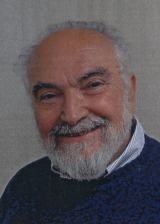
Dr. Joel Lebowitz, the George William Hill Professor of
Mathematics and Physics, received the Vito Volterra Medal from the Academia
Lincea in Rome for his seminal contributions to the development of the field
of nonequilibrium statistical mechanics. His address to the scientists
gathered for the award ceremony in Rome was titled "Order, Chaos, and
Entropy: Reversibility and the Second Law of Thermodynamics."
FRED ROBERTS
RECEIVES NSF SCIENCE AND TECHNOLOGY CENTERS PIONEER AWARD
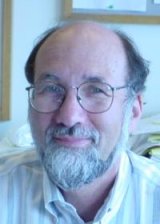
Dr. Fred Roberts, Professor of Mathematics and Director of the Center for
Discrete Mathematics and Theoretical Computer Science (DIMACS) received the
National Science Foundation Science and Technology Centers Pioneer Award. The
award was presented "in recognition of your vision, leadership, and
entrepreneurial spirit in pioneering the science and technology center
concept." DIMACS was one of the original 11 NSF "science and technology
centers," receiving its funding starting in 1989.
EDUARDO SONTAG
RECEIVES RU AWARD FOR EXCELLENCE IN RESEARCH
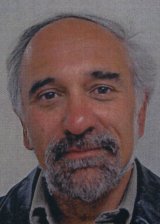
Professor Eduardo Sontag was one of only four faculty members receiving the
Rutgers University Board of Trustees Award for Excellence in Research, the
University's highest honor for outstanding research contributions to a
discipline or to society. Professor Sontag was honored for" his energetic and
creative leadership in applied mathematics and in engineering; his more than
200 publications, which have introduced influential new research directions
and insightful technical innovations; and his contributions in the field of
control theory, both in its theoretical development and in its applications
for practical methods for control-system analysis and design."
JEAN TAYLOR
RECEIVES HONORARY DOCTORATE

Dr. Jean E. Taylor received an Honorary Doctor of Science degree from her Alma
Mater, Mount Holyoke College.
CHRISTOPHER WOODWARD
RECEIVES RU FELLOWSHIP FOR SCHOLARLY EXCELLENCE

Dr. Christopher Woodward was one of six faculty members, all recently promoted
from assistant professor to associate professor with tenure, receiving the
Board of Trustees Fellowship for Scholarly Excellence. The award, designed to
recognize junior faculty whose work shows exceptional promise, includes a
framed citation and a $2,000 research account to continue ongoing
research.
More Faculty Honors
Top
NEW FACULTY THIS YEAR
Professors
Doron Zeilberger joined the Department as a Board of Governor's
Professor of Mathematics, coming to Rutgers from Temple University.
A winner of the AMS Steele Prize in 1998, he is renowned for his
research in algebraic and enumerative combinatorics and also his
explorations in "experimental mathematics" (with his "coauthor"
Salosh B. Ekhad, who is a computer).
Associate Professors
Paul Feehan joined the Department as a tenured Associate
Professor, coming to Rutgers from Ohio State University and the
University of Dublin, Ireland. His research is in partial
differential equations, especially gauge theories and applications to
the topology of four-manifolds.
Assistant Professors
Lara Alcock joined the Department and the Graduate School of Education as a
joint tenure-track Assistant Professor appointment in Mathematics education,
coming to Rutgers with a Ph.D. in Math Education from the University of
Warwick.
Lisa Carbone joined the Department as a tenure-track Assistant
Professor, coming to Rutgers from Harvard University where she
had been a Benjamin Pierce Assistant Professor since 1997. Her
specialties are group actions on trees, tree lattices, and Kac-Moody
groups.
Inna Korchagina joined the Department as an Assistant Professor,
coming to Rutgers from Ohio State University, having completed her
Ph.D. research on finite simple groups under the direction of Ron Solomon.
Stephen Miller joined the Department as a tenure-track Assistant
Professor, coming to Rutgers from Yale University where he had
been an Assistant Professor since 1997. His specialties are number
theory, automorphic forms, and L-functions
Shawn Robinson joined the Department as a VIGRE Assistant
Professor, coming to Rutgers from the University of North Carolina
at Chapel Hill where he finished his Ph.D. thesis in algebraic
geometry (cohomology and K-theory of flag varieties) under
Shrawan Kumar.
Instructors
Yavor Markov joined the Department as an Instructor/Instructional
Technology Specialist and was involved with the Department's
Instructional Technology Initiative (see WeBWorK). He completed his
Ph.D. at the University of North Carolina, Chapel Hill, with a
dissertation in Representation Theory of Lie Algebras and Quantum
Groups directed by Alexander Varchenko.
Top
FACULTY PROMOTIONS
Chuck Weibel was promoted to the rank of Professor
II.
Vladimir Retakh was promoted to the rank of Professor I.
Xiaochun Rong was promoted to the rank of Professor I.
Ovidiu Costin
was promoted to the rank of Associate Professor with tenure.
Chris Woodward
was promoted to the rank of Associate Professor with tenure.
NEW FACULTY FOR FALL 2002
Assistant Professor
Manya Raman will join the Department and the Graduate School of Education as a
joint tenure-track Assistant Professor appointment in mathematics education.
She received her Ph.D. in Mathematics Education from UC Berkeley in June, 2002
and her areas of focus within mathematics education research include high
school college transition, mathematical proof, epistemological beliefs,
advanced mathematical thinking, and textbook analyses.
Top
NEW FACULTY FOR FALL 2003
Assistant Professor
Natasha Komarova will join the Department as a tenure-track Assistant
Professor, coming to Rutgers from the Institute for Advanced Study, where
she has been a member of the Program in Theoretical Biology. She received
her Ph.D. from the University of Arizona in 1998 and has interests in
mathematical biology, mathematical modeling of learning and evolution of
language, nonlinear waves, and integrable systems.
Top
SAM ROSENZWEIG RETIRES
 Sam Rosenzweig was a Rutgers faculty member for over forty years, coming to
Rutgers in 1960 following a two year instructorship at MIT. He received his BS
from City College of NY in 1953 and his Ph.D. from MIT in Algebra in 1958.
Sam served as assistant Chair at Douglass College, on the Undergraduate
Committee, and for many years as the main undergraduate advisor at Douglass
College. He retired as of January 1, 2002 and was honored by the
Department at a retirement party on December 12, 2001.
Sam Rosenzweig was a Rutgers faculty member for over forty years, coming to
Rutgers in 1960 following a two year instructorship at MIT. He received his BS
from City College of NY in 1953 and his Ph.D. from MIT in Algebra in 1958.
Sam served as assistant Chair at Douglass College, on the Undergraduate
Committee, and for many years as the main undergraduate advisor at Douglass
College. He retired as of January 1, 2002 and was honored by the
Department at a retirement party on December 12, 2001.
DEATH OF TILLA WEINSTEIN
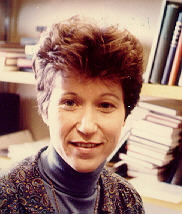 Tilla Milnor Weinstein, a professor of Mathematics at Douglass College
and FAS-NB, died on January 22, 2002. The apparent cause was a
cerebral hemorrhage. She is survived by her sons David and Daniel
Klotz and her husband, Kive Weinstein (mailing address: 2201
Saddleridge Court, Reno, NV 89509).
Tilla Milnor Weinstein, a professor of Mathematics at Douglass College
and FAS-NB, died on January 22, 2002. The apparent cause was a
cerebral hemorrhage. She is survived by her sons David and Daniel
Klotz and her husband, Kive Weinstein (mailing address: 2201
Saddleridge Court, Reno, NV 89509).
LEWIS AND D'ATRI MEMORIAL LECTURES
The
D'Atri lectures, given by
Luis Cafferelli
of the University of Texas, were devoted to "Constraint Methods for
Nonlinear Homogenization in Periodic and Random Media."
NEWS FROM THE
UNDERGRADUATE PROGRAM
(Dan Ocone,
Undergraduate Vice-Chair)
Developments in the Undergraduate Curriculum.
NEWS FROM THE GRADUATE
PROGRAM
(Stephen Greenfield,
Graduate Director)
Five students will earn their Ph.D.'s this year. They are (with advisors
parenthesized):
PIZZA SEMINAR NEWS
(Aaron Lauve,
Curator)
Fall:
9 graduate students and 1 recent graduate spoke; two of the talks
presented original material. The average attendance was 22. The
year-by-year breakdown of who spoke is as follows:
year 1 2 3 4
5+ number 1 1 4 2
2
year 1 2 3 4
5+ number 2 1 4 2
2
ALUMNI NEWS
The Mathematics Department is very interested in hearing from
its alumni/alumnae from either the undergraduate or graduate program, about
where they are and what they are doing. One aim is to set up a
Department website that would facilitate contacts among former graduates and
serve as a source of contacts for our current graduates. We would be
especially interested to know if you are employed in a company that hires
mathematics graduates at any level, since we are seeking summer internship
opportunities for our students and also occasionally look for individuals
willing to come to campus to speak about job opportunities in industry for
mathematics majors. Please let us know if you would be willing to
participate in such activities.
Name:
Current Address:
Job Title and Company:
Home Phone:
Business Phone:
Email address:
Web page url:
News item: If you do not have access to email, please FAX the
information to 732-445-5530 (attention: Alumni Committee) or
mail the information to:
Alumni Committee
Top
Department of Mathematics - Hill Center
Rutgers, The State University Of New Jersey
110 Frelinghuysen Rd
Piscataway, NJ 08854-8019
CONTRIBUTIONS TO THE MATHEMATICS DEPARTMENT
The Mathematics Department would like to thank its alumni and friends for
their past generous support of the Department. Gifts to the Department
enhance our ability to compete for the most outstanding undergraduates and
graduate students, to bring outstanding mathematics faculty as visitors to the
Department, and to support seminars and colloquia. If you would like to help
us by making a contribution, you can do so directly on the web at the URL
https://secure.entango.com/donate/GSuEdXhgRpV by clicking on
"Or choose an academic department:" and selecting Mathematics. If you would
like to discuss various possibilities for a gift to the Department, please
call the Department Chair, Richard Falk, at 732-445-2393.
Maintained by
falk@math.rutgers.edu
and last modified 6/11/2002.

